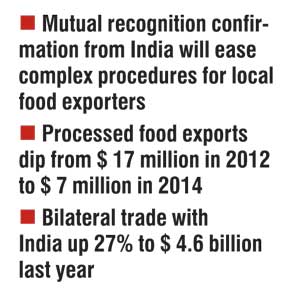Monday Feb 23, 2026
Monday Feb 23, 2026
Monday, 21 December 2015 00:00 - - {{hitsCtrl.values.hits}}
 By Shehana Dain
By Shehana Dain
The Sri Lankan delegation during their visit to India later this month should push for a Mutual Recognition Conformity(MRC) agreement to overcome non-tariff barriers (NTB) present in the current FTA with India, informed sources at Verite Research told the Daily FT.
Verite Research, an independent think-tank based in Colombo in their research report ‘Improving Trade with India’ has proposed that Sri Lanka should come into an agreement with the Indian Government to look into specifics that hinder food products and pharmaceuticals. Non-tariff barriers were identified as the primary lagging factor by the survey that hampered trade between the two countries since the India Sri Lanka Free Trade Agreement (ISFTA) emerged in 2000.
“In terms of trade with India, the biggest challenges we face are Non Tariff Barriers (NTBs). There are complex procedures and delays caused. One such is standards that you have to comply with when it comes to Indian regulations,” sources said.
Addressing concerns the sources added “We think a mutual recognition agreement (MRA) is needed to get Indian authorities to acknowledge that Sri Lanka has the competency and capacity to test for Indian standards in Sri Lanka: tests can be carried out in Sri Lanka and shipped to India and there can be random checking with any shipment.”
At the opening ceremony of the recent India Sourcing Fair, Minister of Development Strategies and International Trade, Malik Samarawickrama said that the high level group from Sri Lanka visiting India in December will address issues with regard to NTBs.
The Verite report looks at the particular NTBs which hamper low shelf life consumer products in light of standards Sri Lankan food exporters need comply with in order to get their exports to India.
Processed food exports have showed a sharp downward trend after recording $ 17 million in 2012 and decreasing to $ 6 million in 2013 and marginally increasing to $ 7 million in 2014, the report highlighted.
“What we found was that even if local products are certified in Sri Lanka by a accredited laboratory the same products have to undergo very strict checking in India as well. This is alright when it comes to durable goods but not when it comes to food products and pharmaceuticals products with a limited shelf life.” “The products are held in ports anywhere between five days to three months. The exporter really has no idea as to how long will it take. There is a lack of information and no transparency. So it leads to a lot of problems when you’re trying to communicate with your buyer from the other side because it’s highly unlikely a buyer would wait for uncertain amount of time until the goods are cleared. It’s really a problem only Sri Lanka is aware of because we are actively engaged with an agreement with India,” according to the sources interviewed who added that, “While Sri Lanka has the advantage of not having to pay import duties on local products our potential to garner the benefits of the FTA is hindered due to NTBs.” According to the Central Bank Annual Report India is Sri Lanka’s biggest source for imports and third largest export market. Around 21% of Sri Lanka›s imports come from India, up from 17.6% in 2013. On the other hand India›s imports from Sri Lanka marginally increased to 5.6% in 2014 from 5.2% in 2013. Indo Lanka bilateral trade amount to $ 4.65 billion in 2014 compared to $ 3.2 billion in 2013 and $ 4.2 billion in 2012.
Moreover 60% of exports in 2014 were facilitated by the India Sri Lanka Free Trade Agreement in 2013 with 65% of exports and 13% of imports coming under the trade agreement.